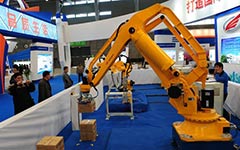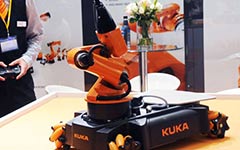|
 |
|
 |
|
 |
As Chinese enterprises feel the pinch of the lack of affordable labor, the emergence of robots seems to offer an efficient way to ease the pain.
In the injection moulding factory of Gree Electric Appliances Inc of Zhuhai in Guangdong, raw plastic is turned into components for air conditioners in an automated process. Robotic arms then place the finished parts on a conveyer belt, while robots also transport goods in the bustling factory.
Almost everything is done by robots, with only packaging left to be handled by human workers, slashing the number needed by the largest maker of home air conditioners in China while making the factory more efficient.
"Since we started to employ robots, the number of workers we hire is down by over 100 from more than 300, but our work efficiency has surged by 20 percent," said Cheng Hailiang, head of the factory.
The same craze for robots can be found in Guangdong's Dongguan city, dubbed the "Factory of the World." According to a government survey, 66 percent of the city's companies have purchased robots in the past five years.
Of those surveyed, 92 percent have plans to increase such investments or to begin using robots in production.
Rage agaist machines
While robots may have improved efficiency in manufacturing, they have also triggered concerns of declining employment opportunities.
Government statistics in Dongguan show that half of the companies employing industrial robots in the city have laid off workers, causing speculation that the industry is posing a threat to China's labor market. But that accusation is refuted by the companies themselves.
"The automation process may have seen some workers laid off, but it has also created a huge number of job vacancies for laborers skilled at controlling the robots," according to Dong Mingzhu, chairman of Gree.
The firm has hired more than 1,000 new recruits this year, and is training them to work in an automated factory. It has also re-trained 372 laborers already working there.
Ding Li, a research fellow with the Guangdong Academy of Social Sciences, believes it is essential for workers to gain new skills if they are to keep pace with what he calls "an intelligence revolution."
"The government should play an important role in training the laid-off workers to help them find jobs, while education departments should beef up human resources programs for the industry," Ding said.
Meanwhile, Wu Xinyu, a research fellow with the Chinese Academy of Sciences, sees robots' dirty work as actually benefiting the human workforce as "the chances of workers facing dangerous environments are lowered."
